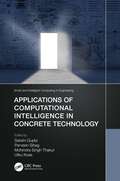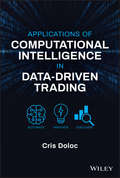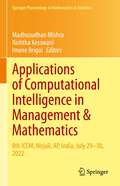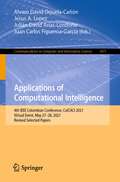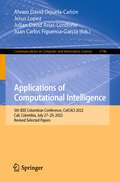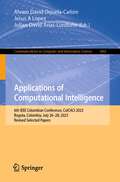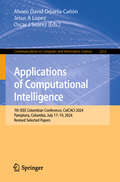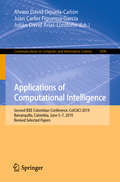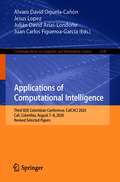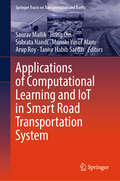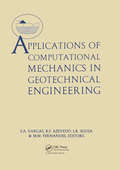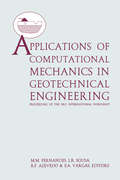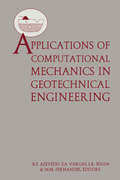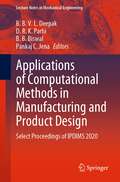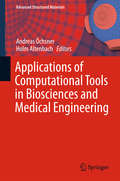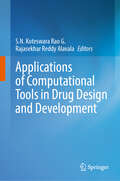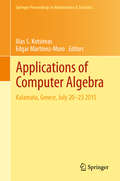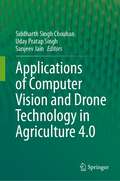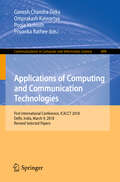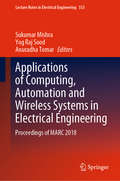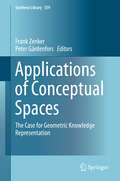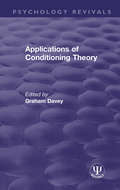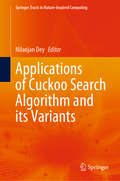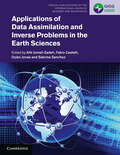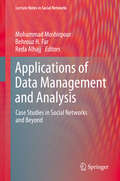- Table View
- List View
Applications of Computational Intelligence in Concrete Technology (Smart and Intelligent Computing in Engineering)
by Sakshi GuptaComputational intelligence (CI) in concrete technology has not yet been fully explored worldwide because of some limitations in data sets. This book discusses the selection and separation of data sets, performance evaluation parameters for different types of concrete and related materials, and sensitivity analysis related to various CI techniques. Fundamental concepts and essential analysis for CI techniques such as artificial neural network, fuzzy system, support vector machine, and how they work together for resolving real-life problems, are explained. Features: It is the first book on this fast-growing research field. It discusses the use of various computation intelligence techniques in concrete technology applications. It explains the effectiveness of the methods used and the wide range of available techniques. It integrates a wide range of disciplines from civil engineering, construction technology, and concrete technology to computation intelligence, soft computing, data science, computer science, and so on. It brings together the experiences of contributors from around the world who are doing research in this field and explores the different aspects of their research. The technical content included is beneficial for researchers as well as practicing engineers in the concrete and construction industry.
Applications of Computational Intelligence in Data-Driven Trading
by Cris Doloc“Life on earth is filled with many mysteries, but perhaps the most challenging of these is the nature of Intelligence.” – Prof. Terrence J. Sejnowski, Computational Neurobiologist The main objective of this book is to create awareness about both the promises and the formidable challenges that the era of Data-Driven Decision-Making and Machine Learning are confronted with, and especially about how these new developments may influence the future of the financial industry. The subject of Financial Machine Learning has attracted a lot of interest recently, specifically because it represents one of the most challenging problem spaces for the applicability of Machine Learning. The author has used a novel approach to introduce the reader to this topic: The first half of the book is a readable and coherent introduction to two modern topics that are not generally considered together: the data-driven paradigm and Computational Intelligence. The second half of the book illustrates a set of Case Studies that are contemporarily relevant to quantitative trading practitioners who are dealing with problems such as trade execution optimization, price dynamics forecast, portfolio management, market making, derivatives valuation, risk, and compliance. The main purpose of this book is pedagogical in nature, and it is specifically aimed at defining an adequate level of engineering and scientific clarity when it comes to the usage of the term “Artificial Intelligence,” especially as it relates to the financial industry. The message conveyed by this book is one of confidence in the possibilities offered by this new era of Data-Intensive Computation. This message is not grounded on the current hype surrounding the latest technologies, but on a deep analysis of their effectiveness and also on the author’s two decades of professional experience as a technologist, quant and academic.
Applications of Computational Intelligence in Management & Mathematics: 8th ICCM, Nirjuli, AP, India, July 29–30, 2022 (Springer Proceedings in Mathematics & Statistics #417)
by Nishtha Kesswani Imene Brigui Madhusudhan MishraComputational intelligence consists of those techniques that imitate the human brain and nature to adopt the decision-making approach. This book contains selected papers from the 8th International Conference on Computers, Management and Mathematical Sciences (ICCM) 2022 about fuzzy systems, neural networks and evolutionary computation that can address stochastic environments where reasoning is a significant attribute to derive potential solutions and focus on the business domain's computational aspects.This is a conference proceedings for scholars/students who are using the powerful algorithms, concepts and principles of computational intelligence in a wide spectrum of research cases.
Applications of Computational Intelligence: 4th IEEE Colombian Conference, ColCACI 2021, Virtual Event, May 27–28, 2021, Revised Selected Papers (Communications in Computer and Information Science #1471)
by Juan Carlos Figueroa-García Alvaro David Orjuela-Cañón Julián David Arias-Londoño Jesus A. LopezThis book constitutes revised and extended selected papers of the 4th IEEE Colombian Conference, ColCACI 2021, which was held virtually in Colombia at the end of May 2021.The 7 full papers presented in the volume were carefully reviewed and selected from 22 submissions. The papers are organized in topical sections on biomedical applications and alternative proposals and its applications.
Applications of Computational Intelligence: 5th IEEE Colombian Conference, ColCACI 2022, Cali, Colombia, July 27–29, 2022, Revised Selected Papers (Communications in Computer and Information Science #1746)
by Juan Carlos Figueroa-García Jesus Lopez Alvaro David Orjuela-Cañón Julian David Arias-LondoñoThis book constitutes the refereed proceedings of the 5th IEEE Colombian Conference on Applications of Computational Intelligence, ColCACI 2022, held in Cali, Colombia during July 27–29, 2022.The 7 extended papers included in this book were carefully reviewed and selected from 38 submissions. They were organized in topical sections as follows: Design of a segmentation and classification system for seed detection based on pixel intensity thresholds and convolutional neural networks.
Applications of Computational Intelligence: 6th IEEE Colombian Conference, ColCACI 2023, Bogota, Colombia, July 26-28, 2023, Revised Selected Papers (Communications in Computer and Information Science #1865)
by Alvaro David Orjuela-Cañón Julián David Arias-Londoño Jesus A LopezThis book constitutes the refereed proceedings of the 6th IEEE Colombian Conference on Applications of Computational Intelligence, ColCACI 2023, held in Bogota, Colombia during July 2023.A total of 11 full papers were carefully reviewed and selected from 42 submissions. They were organized in topical sections as follows: Biomedical Applications, Biological Applications, Engineering Applications.
Applications of Computational Intelligence: 7th IEEE Colombian Conference, ColCACI 2024, Pamplona, Colombia, July 17–19, 2024, Revised Selected Papers (Communications in Computer and Information Science #2212)
by Alvaro David Orjuela-Cañón Oscar J. Suarez Jesus A. LopezThis book CCIS 2212 constitutes the referred proceedings of the 7th IEEE Colombian Conference on Applications of Computational Intelligence, ColCACI 2024, held in Pamplona, Colombia, during July 17–19, 2024. The 11 full papers were carefully reviewed and selected from 35 submissions. They explore various topics in the area of computational intelligence (CI), such as solar and photovoltaic forecasting, microseismical signal analysis, LLM performance analysis, evolution in translate systems, recognition of actors and peacebuilding, control in autonomous vehicles, and electroencephalography signals analysis.
Applications of Computational Intelligence: Second IEEE Colombian Conference, ColCACI 2019, Barranquilla, Colombia, June 5-7, 2019, Revised Selected Papers (Communications in Computer and Information Science #1096)
by Juan Carlos Figueroa-García Alvaro David Orjuela-Cañón Julián David Arias-LondoñoThis book constitutes the thoroughly refereed proceedings of the Second IEEE Colombian Conference, ColCACI 2019, held in Barranquilla, Colombia, in June 2019. The 21 full papers presented were carefully reviewed and selected from 59 submissions. The papers cover such topics as video processing; biomedical systems; image processing, etc.
Applications of Computational Intelligence: Third IEEE Colombian Conference, ColCACI 2020, Cali, Colombia, August 7-8, 2020, Revised Selected Papers (Communications in Computer and Information Science #1346)
by Juan Carlos Figueroa-García Jesus Lopez Alvaro David Orjuela-Cañón Julián David Arias-LondoñoThis book constitutes revised and extended selected papers of the Third IEEE Colombian Conference, ColCACI 2020, held in Cali, Colombia, August 2020. Due to the COVID-19 pandemic the conference was held online. The12 full papers presented were carefully reviewed and selected from 65 submissions. The papers are organized in topical sections on earth sciences applications; biomedical and power applications; alternative proposals and its applications.
Applications of Computational Learning and IoT in Smart Road Transportation System (Springer Tracts on Transportation and Traffic #22)
by Hong Qin Saurav Mallik Tanvir Habib Sardar Subrata Nandi Munshi Yusuf Alam Arup RoyThis book discusses machine learning and AI in real-time image processing for road transportation and traffic management. There is a growing need for affordable solutions that make use of cutting-edge technology like artificial intelligence (AI), machine learning (ML), and the Internet of Things (IoT). The efficiency, sustainability, and safety of transport networks can be greatly increased by implementing an Internet of Things (IoT) and machine learning (ML)-based smart road transport system. Install sensors on roadways and intersections to gather data on traffic conditions in real time, such as vehicle density, speed, and flow. Predicting traffic patterns is done by analyzing the gathered data using machine learning algorithms. This can lessen traffic, enhance overall traffic management, and optimize traffic signal timings. Vehicles equipped with Internet of Things devices can have their health monitored in real time. Parameters including lane changes, brake condition, tire pressure, and engine performance can all be monitored by sensors. Based on the gathered data, ML models are used to forecast probable maintenance problems. By scheduling preventive maintenance, failures can be avoided and overall road safety can be increased. Create a smartphone app that would enable drivers to locate parking spots in their area. To forecast parking availability based on past data, the time of day, and special events, apply machine learning algorithms. Integrate Internet of Things (IoT) sensors into fleet vehicles to monitor their performance, location, and fuel consumption. To maximize fleet efficiency, reduce fuel consumption, and plan routes more effectively, apply machine learning algorithms. Train ML models to forecast the quickest and most efficient routes with the help of historical data analysis. Route recommendations for drivers or fleet management systems can be constantly adjusted with real-time updates, which contain real-time data on road conditions, accidents, and construction. To guarantee smooth integration and efficient implementation, government organizations, transportation providers, and technology firms must work together.
Applications of Computational Mechanics in Geotechnical Engineering
by E.A.VARGAS; R.F.AZEVEDO; L.M.RIBEIRO E SOUSA; M.MATOS FERNANDESThe development of constitutive relations for geotechnical materials, with the help of numerical models, have increased notably the ability to predict and to interpret the mechanical behaviour of geotechnical works. This work covers rock excavations, soil excavations, earth fills and dams.
Applications of Computational Mechanics in Geotechnical Engineering
by M. Matos Fernandes, L. Ribeiro E Sousa, R.F. Azevedo and E.A. VargasThe third international workshop on applications of computational mechanics in geotechnical engineering discussed the area of computational mechanics applied to geotechnical problems. During the event, topics such as ground reinforcement and computational models were covered.
Applications of Computational Mechanics in Geotechnical Engineering
by R.F. Azevedo & E.A. VargasThe development of constitutive relations for geotechnical materials, with the help of numerical models, have increased notably the ability to predict and to interpret mechanical behaviour of geotechnical works. These proceedings cover the applications of computational mechanics in this area.
Applications of Computational Methods in Manufacturing and Product Design: Select Proceedings of IPDIMS 2020 (Lecture Notes in Mechanical Engineering)
by B. B. Biswal Pankaj C. Jena B. B. V. L. Deepak D. R. K. ParhiThis book presents the select proceedings of the conference of Innovative Product Design and Intelligent Manufacturing System (IPDIMS 2020), held at the National Institute of Technology, Rourkela, India. The book addresses latest methods and advanced tools from different areas of design and manufacturing technology. The main topics covered include computational methods for robotics, mechatronics and human-computer interaction; computer-aided design, manufacturing and engineering; aesthetics, ergonomics and UX/UI design; smart manufacturing and expert systems. The contents of this book will be useful for researchers as well as professionals working in the areas of industrial design, mechatronics, robotics, and automation.
Applications of Computational Tools in Biosciences and Medical Engineering (Advanced Structured Materials #71)
by Andreas Öchsner Holm AltenbachThis monograph presents the latest developments and applications of computational tools related to the biosciences and medical engineering. Computational tools such as the finite element methods, computer-aided design and optimization as well as visualization techniques such as computed axial tomography open completely new research fields with a closer joining of the engineering and bio/medical area. Nevertheless, there are still hurdles since both directions are based on quite different ways of education. Often even the "language" is sometimes different from discipline to discipline. This monograph reports the results of different multi-disciplinary research projects, for example, from the areas of scaffolds and synthetic bones, implants and medical devices and medical materials. It is also shown that the application of computational methods often necessitates mathematical and experimental methods.
Applications of Computational Tools in Drug Design and Development
by S. N. Koteswara Rao G. Rajasekhar Reddy AlavalaThis book provides a comprehensive overview of the role of computers and computational tools at different stages of drug discovery and development. Designed to meet the needs of a beginner to advanced learner, the book provides the information on the tools, how they work, with the latest reports on applications in drug design, drug delivery and building network pharmacology models. Part I explores the pharmacological aspects, covering computational simulation of drug delivery at the molecular level, modeling for formulation design, and the revolutionary use of computational fluid dynamics in pharmaceutical processes. Specific applications such as pharmaceutical die filling processes, inhalation aerosol-based targeted drug delivery, and the development of inhalation compounds using in silico modeling tools are discussed. The use of computational tools in cheminformatics and their application in preformulation perspectives for drug delivery are also included. Part II expands the scope to include solubility prediction, absorption prediction, protein binding prediction, bio-permeability prediction, toxicity prediction, and metabolism prediction. It covers the identification of potential sites of metabolism in lead molecules and computer-assisted simulation studies to understand drug-polymer interactions. Recent advances in drug likeness screening using software and online tools are also reviewed. Part III focuses on specific therapeutic areas. <span class=
Applications of Computer Algebra: Kalamata, Greece, July 20–23 2015 (Springer Proceedings in Mathematics & Statistics #198)
by Ilias S. Kotsireas Edgar Martínez-MoroThe Applications of Computer Algebra (ACA) conference covers a wide range of topics from Coding Theory to Differential Algebra to Quantam Computing, focusing on the interactions of these and other areas with the discipline of Computer Algebra. This volume provides the latest developments in the field as well as its applications in various domains, including communications, modelling, and theoretical physics. The book will appeal to researchers and professors of computer algebra, applied mathematics, and computer science, as well as to engineers and computer scientists engaged in research and development.
Applications of Computer Vision and Drone Technology in Agriculture 4.0
by Sanjeev Jain Siddharth Singh Chouhan Uday Pratap SinghThis edited book focus on two most emerging areas and covers the different aspects of computer vision and drone technology in the field of agriculture. It comprises various applications including segmentation/classification of plant diseases, monitoring of crops, grade/quality estimation of fruits/flowers/vegetables/crops, surveillance, soil deficiency estimation, crop/plant growth estimation, canopy measurement, water stress management, vegetation indices calculation, weed detection, and spraying, among other. It has 17 chapters contributed by experts in the field of computer vision, drone technology, deep learning, machine learning, artificial intelligence, image processing, agriculturist, and plant pathologists. The recent development of high-end computing devices and the adaptation of unmanned aerial vehicles has provided a mechanism to automate traditional agriculture practices. The on-field or aerial images captured using cameras are processed with the help of intelligent algorithms, and an assessment is drawn for further recommendations. This practice is efficient in provisioning an accurate, timely, and economical decision-making system to overcome the problems of agricultural field experts and farmers. This process is advantageous in increasing the quality and quantity of crop yields. This book serves as an excellent guide to students, researchers, scientists, and field experts in directing their work toward this domain and developing/designing models. Further, this book is useful for pathologists, biotechnologists, seed production specialists, breeders, market managers, and other stakeholders associated with underlying technology or market development from the public and private sectors.
Applications of Computing and Communication Technologies: First International Conference, Icacct 2018, Delhi, India, March 9 2018 (Communications In Computer And Information Science #899)
by Ganesh Chandra Deka Omprakash Kaiwartya Pooja Vashisth Priyanka RatheeThis book (CCIS 899) constitutes the refereed proceedings of the First International Conference on Applications of Computing and Communication Technologies, ICACCT 2018, held in Delhi, India, in March 2018. The 30 full papers were carefully reviewed and selected from 109 submissions. The papers are organized in topical sections on communication and system technologies, computing and network technologies, application and services.
Applications of Computing, Automation and Wireless Systems in Electrical Engineering: Proceedings Of Marc 2018 (Lecture Notes in Electrical Engineering #553)
by Yog Raj Sood Sukumar Mishra Anuradha TomarThis book discusses key concepts, challenges and potential solutions in connection with established and emerging topics in advanced computing, renewable energy and network communications. Gathering edited papers presented at MARC 2018 on July 19, 2018, it will help researchers pursue and promote advanced research in the fields of electrical engineering, communication, computing and manufacturing.
Applications of Conceptual Spaces: The Case for Geometric Knowledge Representation (Synthese Library #359)
by Peter Gärdenfors Frank ZenkerThis volume provides an overview of applications of conceptual spaces theory, beginning with an introduction to the modeling tool that unifies the chapters. The first section explores issues of linguistic semantics, including speakers' negotiation of meaning. Further sections address computational and ontological aspects of constructing conceptual spaces, while the final section looks at philosophical applications. Domains include artificial intelligence and robotics, epistemology and philosophy of science, lexical semantics and pragmatics, agent-based simulation, perspectivism, framing, contrast, sensory modalities, and music, among others. This collection provides evidence of the wide application range of this theory of knowledge representation. The papers in this volume derive from international experts across different fields including philosophy, cognitive science, linguistics, robotics, computer science and geography. Each contributor has successfully applied conceptual spaces theory as a modeling tool in their respective areas of expertise. Graduates as well as researchers in the areas of epistemology, linguistics, geometric knowledge representation, and the mathematical modeling of cognitive processes should find this book of particular interest.
Applications of Conditioning Theory (Psychology Revivals)
by Graham DaveyThe area of applied psychology known as behaviour modification or behaviour therapy had progressed remarkably in the ten years, prior to publication. Illustrative of this progress is the variety of therapeutic and behaviour management techniques now available to the applied psychologist. This volume, originally published in 1981, describes some of the important characteristics of this development, and in particular, the relationship between behaviour change techniques and the principles of conditioning theory that generated them. This brief gives rise to three main themes. First, the book describes some of the reasons underlying the adoption of the conditioning paradigm and the epistemological advantages of the paradigm for behaviour modification. Second, a number of chapters discuss the current trends in specific areas of applied psychology where conditioning principles play an important heuristic role. These chapters deal with the uses made of conditioning theory in the areas of mental handicap, psychiatric therapy, work organizations, and the treatment of brain injury. Third, later chapters discuss some of the more recent theoretical developments in the field of behaviour modification/therapy, in particular the drift from strict behaviouristic applications of conditioning principles to more cognitive ones.
Applications of Cuckoo Search Algorithm and its Variants (Springer Tracts in Nature-Inspired Computing)
by Nilanjan DeyThis book highlights the basic concepts of the CS algorithm and its variants, and their use in solving diverse optimization problems in medical and engineering applications. Evolutionary-based meta-heuristic approaches are increasingly being applied to solve complicated optimization problems in several real-world applications. One of the most successful optimization algorithms is the Cuckoo search (CS), which has become an active research area to solve N-dimensional and linear/nonlinear optimization problems using simple mathematical processes. CS has attracted the attention of various researchers, resulting in the emergence of numerous variants of the basic CS with enhanced performance since 2019.
Applications of Data Assimilation and Inverse Problems in the Earth Sciences (Special Publications of the International Union of Geodesy and Geophysics #5)
by Dylan Jones Alik Ismail-Zadeh Fabio Castelli Sabrina SanchezMany contemporary problems within the Earth sciences are complex, and require an interdisciplinary approach. This book provides a comprehensive reference on data assimilation and inverse problems, as well as their applications across a broad range of geophysical disciplines. With contributions from world leading researchers, it covers basic knowledge about geophysical inversions and data assimilation and discusses a range of important research issues and applications in atmospheric and cryospheric sciences, hydrology, geochronology, geodesy, geodynamics, geomagnetism, gravity, near-Earth electron radiation, seismology, and volcanology. Highlighting the importance of research in data assimilation for understanding dynamical processes of the Earth and its space environment and for predictability, it summarizes relevant new advances in data assimilation and inverse problems related to different geophysical fields. Covering both theory and practical applications, it is an ideal reference for researchers and graduate students within the geosciences who are interested in inverse problems, data assimilation, predictability, and numerical methods.
Applications of Data Management and Analysis: Case Studies in Social Networks and Beyond (Studies in Big Data #27)
by Reda Alhajj Mohammad Moshirpour Behrouz H. FarThis book addresses and examines the impacts of applications and services for data management and analysis, such as infrastructure, platforms, software, and business processes, on both academia and industry. The chapters cover effective approaches in dealing with the inherent complexity and increasing demands of big data management from an applications perspective.Various case studies included have been reported by data analysis experts who work closely with their clients in such fields as education, banking, and telecommunications. Understanding how data management has been adapted to these applications will help students, instructors and professionals in the field. Application areas also include the fields of social network analysis, bioinformatics, and the oil and gas industries.
